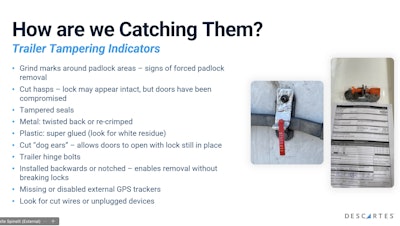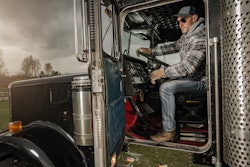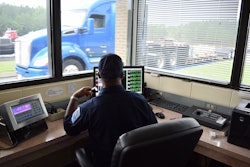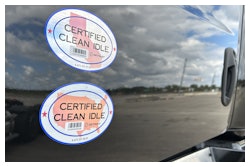The California Highway Patrol's Cargo Theft Task Force began a recent webinar by showing video footage of a warehouse stacked so high with boxes of stolen goods that the police found themselves learning to operate forklifts.
Cargo theft losses totaled $445 million in 2024, according to CargoNet data. Freight fraud, more broadly, which would include things like double brokering, takes an estimated $800 million out of the supply chain each year.
Cargo theft is a "growing issue that we’re dealing with throughout the state," said CHP Lieutenant David Navarro. Navarro heads up the border division, one of four regions within the state's cargo theft task forces. As such, he sees lots of cross border trade and thefts, and the problem is so widespread thieves are getting picky.
"Recently, crews that we're working on, if they find mixed loads of products, they're bypassing it," he said. "They're looking for one uniform product because it's much easier to fence or sell because they can offer the entire load for one price versus each item" for a separate amount.
That's right, cargo theives are spoiled for choice and doing their own rate-per-mile calculations on stolen freight.
"A lot of it gets sold to liquidation centers," he said of stolen goods from cargo theft. "The people who own [the liquidation centers] claim they didn’t know [the goods in the warehouses] were stolen half the time."

That's just the tip of the iceberg when it comes to obstacles in prosecuting, let alone stopping cargo theft.
Nonetheless, Navarro and his team routinely "go into manual labor mode" to clear out warehouses full of stolen cargo and load them back onto trailers.
Navarro estimated the task force has located between $100-$250 million in stolen goods from crews of thieves that pull heists constantly.
"There's this crew, just one crew, that's ripping loads at a rate of five to seven a week," he said. "Sometimes multiple loads a day. They keep us very busy."
[Related: Don't be an unwitting accomplice to cargo theft: Cautionary tale]
As for the estimated total losses of $445 million a year, he said that's likely on the low side.
"The problem with cargo theft is I would say 75% probably goes unreported," he said. "I look at the number as extremely low." He noted that both the private sector and law enforcement have reasons to keep quiet about thefts.
But as victims go quiet, the criminals get bolder and bolder. CHP showed video of a train passing through the California desert with doors pried open on dozens of containers. The thieves, they said, walk up and down the train, popping seals and looking for easily movable goods to loot, sometimes simply throwing high value electronics and sneakers off the train as their buddies in box trucks trail behind. With all that access to loot and relatively limited capacity to move it, CHP said thieves are getting picky.
"Cargo theft is so popular" for the simple fact of it being "low risk and high reward," he added, referencing a patchwork of federal and state laws, also the difficulty in pinpointing which exact jurisdiction a theft happens in.
Cargo theft a veritable industry, complete with specialized equipment, best practices
With the big money comes a whole set of industry practices for thieves. The task force said thieves make their own trailers with seals that are easy to defeat, or bolts on the exterior to facilitate theft. One particularly bold example showed a latch made out of tinfoil.

"Another issue is prosecution," Navarro noted. Because of California's "catch and release" policies, his unit often arrests the same criminals multiple times. "It can be disappointing for us when we spend months or years on an investigation, and by the time the report is done," the criminals are already out of jail and back to old tricks. "But we do our job either way, even if we need to catch them two, three or four times."
Brazen thieves might hit the same warehouse multiple times, sometimes resulting in police chases with big rigs that hit 100 mph.
In one specific case, a CHP officer recounted putting a tracking device on a suspect's vehicle that kicked off a two year investigation. After arresting the suspects at the conclusion of the long investigation and serving "a bunch of warrants on their houses and storage units" to find stolen freight, "they ended up getting eight years in state prison," the officer said. "For a property crime, that's actually really good."
Only that wasn't the last they heard of that particular crew. The task force got a call saying "your guys are back at it," and despite initial disbelief, the police found the court let them out of jail after one year, only to be arrested again.
"We'll see how long that's going to stick," said the officer.
Navarro said the added work isn't the most frustrating thing the task force deals with. Rather, "when they get out with short sentences" after their day in court has given them plent intel on "what not to do."
He noted the task force has to "explain in simple terms to the jury" how they caught the criminals, including essentially an entire briefing for the crooks on the methods and sources law enforcement used to catch them. It all doubles as a "free education" for the thieves that can just try again, and smarter this time, in just a year or so.
"It gets harder and harder to catch the same crews when we keep teaching them what not to do," said Navarro.
[Related: Cargo thieves busted in L.A., $4M in stolen goods recovered]










